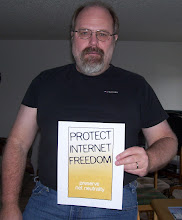
A year passes like nothing, and not just for the Fabulous Furry Freak Brothers.
One year ago when I started this blog (galvanized by my anger at, embarrassment for, and mingled amusement and distaste around Alabama Attorney General Troy King), I never imagined that Reality Catcher would get 90,000 hits in its first year on the Web. Neither did I imagine making the front page of Digg four times and narrowly missing (mostly due to Digg's "Bury" button, which in practice serves to dumb down content by suppressing controversial stuff) a dozen other times.
I'm sure there are much better ways to pick the year's highlights than by number of Diggs, but that would involve lots of subjectivity and hard thinking, so I'm going with the Diggs. This also means that almost all the posts featured will come from June onward, because after joining Digg in April, it took me a couple months to learn how to properly promote a story (the lone exception was posted in March, but submitted by another Digg user in August).
During the course of the year, I've taken on the Attorneys General of two states, the privileged rich, the U.S. Drug war, the DEA, Sarah Palin, John McCain, Barack Obama, the Patriot Act, FISA, the police state, the King County Prosecutor's office, the Seattle Police Department, Dino Rossi, and the Washington Department of Corrections.
If that doesn't sound like your idea of fun, well then, you don't know me very well. :-)
So, going by number of votes on Digg, here they are:
Washington Attorney General Rob McKenna
10. Attorney General Rob McKenna Is Not Cool Oct. 7 (226 diggs)
After being informed in April by my probation officer that, despite being a legal medical marijuana patient under the laws of Washington, I wasn't permitted by the Department of Corrections to use my legal, physician-recommended medicine, I was mad. I use pot legally to control the nausea, body aches, and headaches associated with my Hepatitis C.
After further learning that said policy came straight down from the office of Attorney General Rob McKenna, I had a focus for my anger. (That's what feeling nausea non-stop will do to you.) I wrote my first McKenna piece, "Washington Atty. Gen. Rob McKenna Likes Playing Doctor," on April 22. Republican apologists (within the medical marijuana movement!) told me McKenna was "just doing his job," which, as I pointed out on April 26, is patently wrong, because McKenna's job is to enforce Washington state law, not the federal dictates of his GOP overseers in the Bush administration.
On Oct. 7, I returned one more time to the McKenna controversy, and the resulting piece was re-published by OpEdNews.com, where it got 226 diggs to come in at 10th place for the year.

9. The Wide Divide: You Are Being Ripped Off June 16 (299 diggs)
My preeminent class-warfare post of the year, "The Wide Divide," was inspired by seeing a chart (reproduced with the piece) published by the New York Times which showed the difference between average worker pay and CEO compensation.
The diggs for this one are divided between the Reality Catcher post itself (134) and the OpEdNews reprint (165), for a total of 299 and ninth place. Both articles were eventually buried on Digg.com after garnering lots of interest, presumably because they pissed off our rich overseers.
The reaction to this one was extraordinary. Groups ranging from British libertarians (who told me I'm a socialist) to American liberal Christians (who weren't crazy about my cussing) to American libertarian site Freedom's Phoenix reprinted the piece, and all found a few things to agree with or at least use as jumping off points for discussion.

8. Travel Pro Steves To Challenge Futile U.S. Drug War March 22 (306 diggs)
In late 2007, I attended the Seattle taping of the Rick Steves-hosted, ACLU-sponsored informercial, "Marijuana: It's Time For A Conversation" at the KOMO studios. When the finished product aired on cable TV (ironically, the cowardly douchebags at KOMO itself refused to air it, after having promised they would), I recorded and uploaded it to Google video and, in three parts, to YouTube (no, the ACLU doesn't mind, and in fact, they've thanked me).
The complete 30-minute video on Google has received almost 37,000 views, and the three parts on YouTube combine for another 19,000, totaling 56,000 views and resulting, according to the Washington ACLU, in countless hits for their site.
I never intended for this one to be submitted to Digg, since I accompanied the Google video not with my own writing, but with a Seattle Post-Intelligencer story by reporter Joel Connelly about the show. But on August 12, another Digger submitted my blog post, which managed to get 306 diggs.

7. Sarah Palin: Dick Cheney In A Dress Aug. 29 (591 diggs)
Timing can be everything on the Internet. And as one of the first Sarah Palin hatchet jobs on the Web, this one got lots of attention.
Although it never went front page, it did rack up 591 diggs and was widely linked and reproduced around the Web. The "Cheney in a dress" meme caught on (yes, I was the first to say it) and ended up being repeated on nationwide TV by The View's Joy Behar -- alas, without attribution.
As soon as John McCain announced his choice for a vice-presidential running mate, I knew I was going to write this piece. The only thing that surprised me was how easy it was to show what a ridiculous choice he had made.

6. Privacy's Twilight: The Rise of the Total Surveillance Society July 10 (606 diggs)
"Privacy's Twilight," inspired by the Bush administration and the Patriot Act, along with the failure of Congress to hold the telecoms culpable for illegally spying on their own customers at Bush's request, got 408 diggs on Reality Catcher and another 198 on OpEd News.
The outlook is bleak: "Every day, we are one step closer to the Total Surveillance Society. Every day, we lose a little more of that part of being human that claims the right to be left alone, that knows freedom from the prying eyes of the corporate state, that has the boldness to claim some inner sanctum where the all-seeing eyes of technology cannot penetrate."
But the piece pointed out that privacy does have its champions, including the EFF and the ACLU, and noted: "A surveillance society can work in both directions. The wide proliferation of camcorders, cell phones, and recording devices of various kinds gives we the people a way to at least record, if not prevent, the misdeeds of our corporate and governmental overseers."

Errand boys of the police state prepare to bust heads in Minneapolis
5. Arresting The Messengers: The Bush Administration's Assault On Journalism Sept. 3 (672 diggs)
Written during the brutal police crackdown surrounding the Republican Convention in Minneapolis/St. Paul, this piece got more diggs, at 672, than any other non-front page story in this roundup.
The story, however, got "buried" on Digg, which prevented it from going front page and getting exposure to an even larger audience; once a story receives a certain number of "buries" (the exact algorithm is a closely guarded Digg secret), it won't go front page no matter how many diggs it gets.
Here's hoping that the incoming Obama administration will find a more productive way to deal with journalists (and protesters) than with billy clubs and pepper spray.

Mobile Press Register political cartoonist J.D. Crowe's take on Troy King's sex toy phobia
4. Alabama's Nut Job Attorney General Wants To Ban Sex Toys And Sing With Dead People June 27 (856 diggs)
It's true that you never forget your first time. My third hatchet job on Alabama Atty. Gen. Troy King (admittedly an easy target) was the very first time one of my blog posts went all the way to Digg's front page, and what an unforgettable thrill of validation that was!
I knew I was going to write this piece ever since Atty. Gen. King's spokesman Chris Bence mouthed off that "the West Coast is a good fit for Elliott. Outside the state is the best place for him."
If that didn't merit a good proper trip to the woodshed, I don't know what would. So yeah, Troy got a good ol' Alabama ass-whuppin.' Hell, rumor is he may have enjoyed it. (Do your own research.)

Illustration: NORML
3. Prediction: Medical Marijuana Will Be Legal Coast To Coast By 2021 Dec. 22 (1110 diggs)
Ever since Michigan overwhelmingly passed their medical marijuana law on Nov. 4, I knew I was going to write this piece. It just got put off a few weeks, because (against the advice of Atty. Gen. Troy King and his minions), I spent the month of November visiting family in Alabama, with limited Internet access.
Once I did get back to Washington and got around to writing it, the excitement I felt at the possibility of coast-to-coast medical legalization of my favorite weed definitely infused the post.
I came up with the year 2021 (which several activists told me was far too pessimistic, and others told me was impossibly optimistic) by allowing for half-a-dozen more election cycles (12 years), taking into the account that a steadily increasing majority of American voters favor medical pot.

Martin Martinez at Lifevine's office after the Seattle Police Department searched the premises, knocked a wall down, and unlawfully took 12 ounces of legal medical marijuana. Photo by Courtney Blethen of the Seattle Times
2. 'Just Doing Our Job. Sorry About Your Wall And Your Marijuana.' July 20 (1369 diggs)
I wrote this one after the Seattle Police Department raided the offices of my friend Martin Martinez and his patient advocacy group Lifevine in Seattle, seizing 12 ounces of what was supposed to be legal medical marijuana, seizing his patient records, and knocking down his wall. (Are you starting to get the idea that I do my best writing when I'm pissed off? Whatever works.)
My outrage that Washington's medical marijuana law was ignored -- a full 10 years after it was passed by the voters -- was channeled into creating this piece, which I understand created a few headaches for the King County Prosecutor's Office and the Seattle Police Department.
Martinez's attorney got the SPD to return Martinez's records -- supposedly without having read or copied them -- but the cops deliberately dragged their feet about returning Martin's medicine, until federal Drug Enforcement Administration (DEA) agents swooped in and confiscated it right out of the evidence locker.

1. An Open Letter To Senator Obama: Please Vote NO On Telecom Immunity - Get FISA Right June 29 (2276 diggs)
My open letter to President-Elect Obama, back when he was just the Democratic nominee, struck a chord with idealistic Diggers and others who were scandalized by retroactive immunity provisions of the FISA act which basically let the telecom companies off the hook for illegally spying on ordinary Americans at Bush's request. This story generated more than 20,000 hits to the site, more than any other post all year.
Of course, Obama's "move toward the middle" meant that he abandoned his earlier position to oppose any bill which included telecom immunity, and presumably to prevent an attack from the Republican Right during the presidential campaign, he voted for the deeply flawed bill, immunity and all.
Senate Majority Leader Harry Reid has given a glimmer of hope by saying that "FISA will be revisited" after Obama takes office. We'll see.
.......
Here's to a progressive 2009... Happy New Year!


























 Not mainstream, by a fur piece. Photo credit:
Not mainstream, by a fur piece. Photo credit: 





































